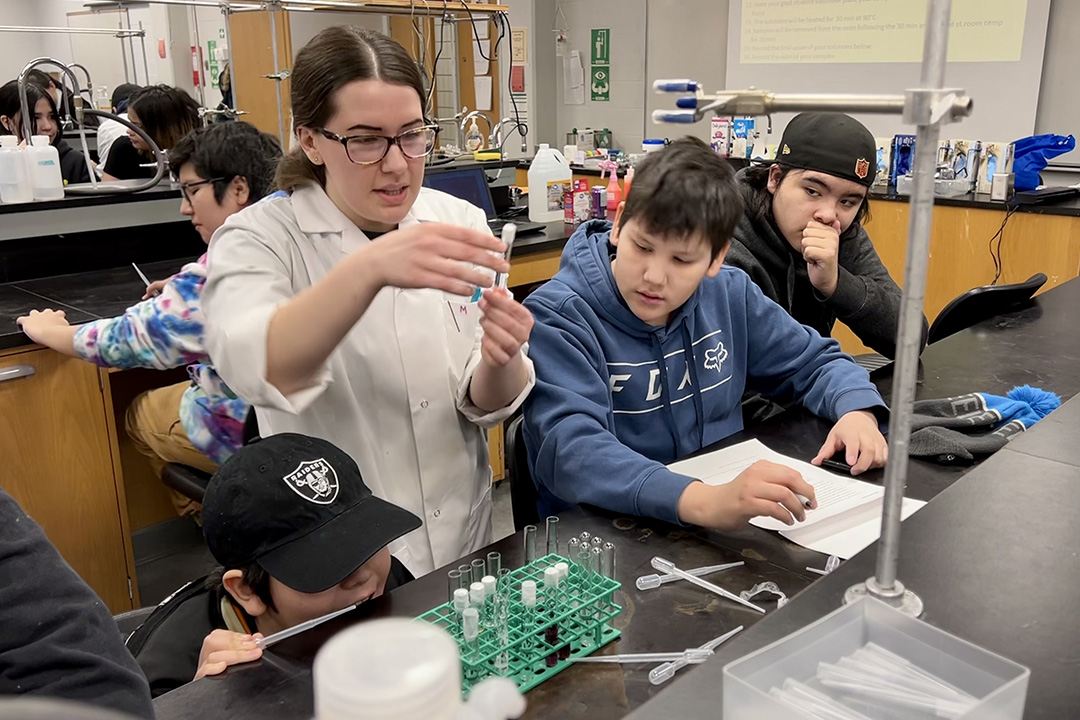
USask graduate student provides STEM experience for Indigenous elementary students
As a Natural Sciences and Engineering Research Council of Canada (NSERC) Indigenous Student Ambassador at the University of Saskatchewan (USask), Morgan Fleming is creating opportunities for Indigenous students to engage in science.
By Kira GlasscockOn March 9, Grades 7 and 8 students from Chief Whitecap School in Saskatoon had the opportunity to learn about food science during an outreach day organized by Fleming, a Métis master’s student in the food science program in the Department of Food and Bioproduct Sciences (FABS). The outreach day was held at the College of Agriculture and Bioresources (AgBio) and was funded by an NSERC Indigenous Student Ambassadors grant awarded to Fleming.
“I heard about the NSERC student ambassador award from an old lab mate, and it was through searching for this one that I came across the Indigenous student ambassador application,” said Fleming.
The NSERC Indigenous Student Ambassadors grant aims to engage Indigenous students in promoting science and engineering (STEM) to Indigenous youth by delivering hands-on activities. The grant provides ambassadors with up to $5,000 for outreach initiatives.
“I applied once I learned about the lack of Indigenous students in grad studies in the FABS department and that in Canada only two per cent of people employed in STEM are Indigenous. I want to try to change these numbers.”
As part of the application process Fleming develop a proposal that outlined her plans to engage the youth in STEM activities.
“I came up with the ideas through what interests me, conversations with my lab mates and supervisors, as well as conversations with the science teachers at Chief Whitecap School,” explained Fleming.
Fleming recruited other graduate students in her department to assist with the outreach activities.
During their visit to the college, the students performed food science experiments involving colourants, cross contamination, Maillard reaction, and vitamin c titration. With funding from the grant, Fleming also provided supplies for the students to develop food science-based posters following the science day.
"Science outreach activities are incredibly important to expose Indigenous youth to the University of Saskatchewan and the College of Agriculture and Bioresources,” said Jordie Gagnon, senior strategic officer, Indigenous programs and partnerships for the college. “These events allow our youth to explore hands-on activities that may well lead them down an educational path that connects them to our college down the road.”
“Morgan’s passion and dedication to her field provide a clear example of how one day these youth can roam the halls as a future AgBio student working towards their degree in an agriculture related discipline.”
Fleming’s own interest in science developed in elementary school through the interactive activities planned by her teachers, she said.
For her thesis research, Fleming is studying how phenolics—compounds present in plant-based foods, such as Haskap berries—function to improve cell health and increase cell lifespan.
“I have a love for food and science, as such combining the two felt like a perfect fit for myself,” said Fleming. “I was introduced to the concept of nutraceuticals like phenolic compounds in Dr. (Chris) Eskiw’s (PhD) FABS 362 class that I took my first year at the University of Saskatchewan and was even further intrigued.”
Fleming hopes her efforts as an NSERC Indigenous Student Ambassador helps to spark an interest in science with Indigenous students.
“It’s a fun and memorable way for the students to learn and in addition bringing them to the university may help them envisage themselves attending as students here,” said Fleming.

